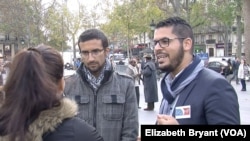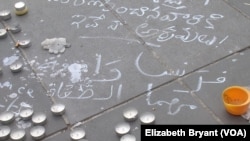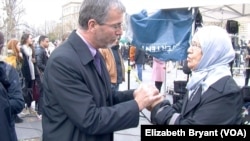Dressed in a sharp grey suit with a button sporting the logo of France’s new Muslim party, Nizarr Bourchada showed up at the Place de la Republique this week to pay tribute to the 129 people killed in last week’s Paris attacks - and to explain.
“I’m here to express my compassion,” said Bourchada, a municipal counselor in a town south of Paris, as people placed flowers and candles before makeshift memorials for the victims. “But Muslims also count among the victims of the attacks. Muslims are also affected and shocked.”
With the French government declaring war against the Islamic State group, which claimed responsibility for the attacks, Friday’s carnage around the capital has left the French both defiant and bracing for more acts of terror.
Bourchada and other members of the country’s five-million strong Muslim community face an additional burden: fear of a backlash.
After the attacks, Bourchada’s Union of French Muslim Democrats joined other political parties in suspending its campaign for December's regional elections. Party members, however, say they believe their message - that Muslims need and deserve a bigger voice in France - is more relevant than ever.
“For ten years, Muslims have been seen through the prism of Islamism and jihadism,” Bourchada said. “We aim to show to French citizens that Muslims today participate in citizen life, in economic life and will also participate in political life.”
'We are united'
They're not the only ones speaking out. The group Muslim Students of France, on its website, has called for a strong response to terrorism and expressed condolences to families of the victims under the hashtag #NousSommesUnis (WeAreUnited).
Many Muslims also joined the millions of French who marked a moment of silence Monday around the country. Additionally, the grand mosque of Paris has urged the Islamic community to turn out in force Friday afternoon for an anti-terror demonstration.
“We’re all French,” said Faical Ouertani, whose Tunisian friends lost their grandchildren in the attacks. “These people want to divide us. We want to say we’re not afraid of you.”
The sense of unity is far from universal. Muslim activists say anti-Islamic acts soared following January’s terrorist attacks here. In both those and this latest set of attacks, the assailants are believed to be second-generation immigrants with Muslim roots.
Anti-Muslim acts
The National Observatory Against Islamophobia, linked to a prominent Muslim umbrella group, the French Council of the Muslim Faith, reported 330 anti-Muslim acts during the first nine months of this year - a 200 percent increase from the previous year.
“Muslims in France are in a terrible situation,” said French sociologist Michel Wieviorka.
While January’s attacks singled out a French newspaper and Kosher store, “with these attacks, all the French are targeted. So the feeling in France is much wider and much stronger,” Wieviorka said, suggesting the anti-Muslim fallout may be more intense as well.
Scattered anti-Muslim acts - graffiti daubed on mosques, stones thrown at a kebab restaurant and “death to Muslims” scrawled on the wall of a Normandy town - have already been reported in recent days.
The political rhetoric is sharpening as well. While in January, the government’s first reaction was to urge French to reach out to Muslims as “the first victims” of terrorism, Prime Minister Manuel Valls has instead talked about the importance of expelling radical imams in recent days.
Refugees
There are also fears of reprisals against Muslim refugees, after Greek officials said one of the Paris suicide bombers counted among the wave of asylum seekers entering Europe.
French far-right leader Marine Le Pen is calling for the closing of French borders, repatriating residents considered a security threat and “an immediate halt” to the influx of migrants.
Turkish tourist Mustafa Etkaturk, standing near the Bataclan music hall to pay his respects to more than 80 people killed there in Friday’s attacks, said he felt uncomfortable strolling around the city.
“I get the question, ‘where are you from,’” Etkaturk said. “The second question is, ‘are you a Muslim?’”
Still, among many Parisians, a sense of solidarity prevails.
“I feel as if it were my own children who died,” said a 70-year Algerian woman called Fatiha, who joined the crowds at Republique square on Monday. “I’m incensed when people mix us up with those extremists.”
An elderly man took her hand. “Not all French do that, madame,” he said. “Today, we’re all together.”






